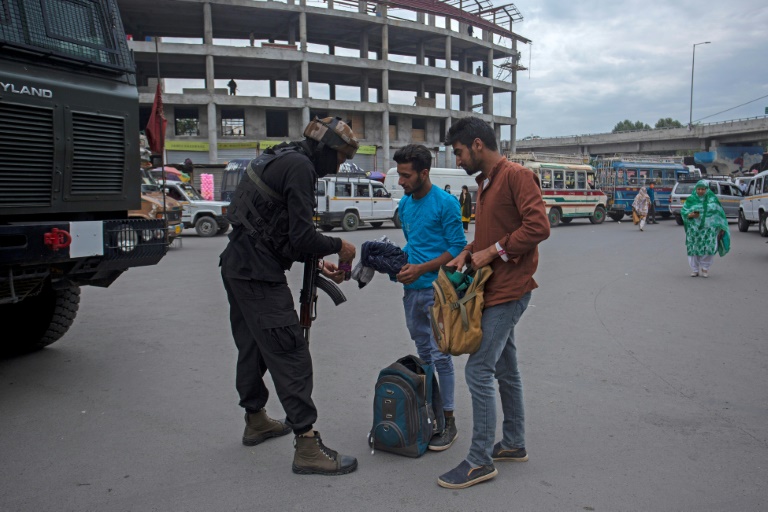Hundreds of extra police and troops were deployed in Indian-administered Kashmir Thursday as separatist groups called for a shutdown to mark a “black day” on the second anniversary of New Delhi imposing direct rule.
Kashmir has been divided between India and Pakistan since 1947 with both claiming the territory in full.
Fighting in the past two decades in the Indian-controlled part has left tens of thousands dead, mostly civilians.
Prime Minister Narendra Modi’s government scrapped the Muslim-majority region’s partial autonomy on August 5, 2019, and split it into two federal territories.
Thousands were arrested, scores of whom remain behind bars two years on.
Ahead of the second anniversary, security forces erected numerous new checkpoints and barricades across Srinagar, with personnel in bulletproof gear checking vehicles and frisking residents.
Suspected rebels fired live shots in the air in the heart of the congested old town Srinagar where a low intensity explosive device also went off, witnesses said.
In the Sopore area unknown rebels fired at police as authorities tried to force shopkeepers observing the shutdown to open their doors, an officer told AFP.
District police denied the incident took place however in a post on Twitter.
Top separatist leader Syed Ali Geelani, 90, had called for a general shutdown to mark a “black day” in protest at “India’s naked aggression”, in a Twitter statement by his Pakistan-based representative.
The call was supported by several smaller separatist groups who also challenge India’s rule over Kashmir.
One group headed by Kashmir’s incarcerated chief cleric and politician Mirwaiz Umar Farooq appealed to “citizens of India and the world at large” to see how India’s actions two years ago “complicated” the dispute over the territory further.
On Thursday most shops remained closed in Srinagar and there were few cars on the road, but police in the capital city were seen asking shopkeepers to open.
Many businessmen, without wishing to be named, told AFP that police had threatened them.
Local reporters said officers were breaking locks on shutters.
“I was recording video of shuttered shops when police officers arrived and took my photos while I was working and accused myself and journalists of instigating a shutdown,” photojournalist Umer Asif told AFP.
Witnesses and traders in three towns in the volatile southern Kashmir valley also told AFP that police were threatening and forcing shopkeepers to open their stores.
– ‘Resist to exist’ –
Former Kashmir chief minister Mehbooba Mufti, who along with dozens of other local politicians spent months incarcerated after being arrested in the 2019 clampdown, led a protest in Srinagar that police stopped from marching to the city centre.
“When unbridled oppression is unleashed & gross injustice heaped there is no other choice but to resist to exist,” she tweeted.
Bashir Ahmad, a shopkeeper in downtown Srinagar, said that since the “injustice” of what happened in 2019, people no longer feel “safe and secure”.
“Anyone who speaks up is being crushed without reason,” he told AFP.
Government minister Jitendra Singh said in an editorial in the Indian Express daily that Kashmir was now moving toward “deepening democracy, fulfilling people’s aspirations, (and) increasing economic growth”.
About 1,000 people marched in Muzaffarabad — the capital of Pakistan-administered Kashmir — where protesters chanted anti-Indian slogans and burnt the country’s flags, according to an AFP reporter.
In Islamabad Pakistan’s president and foreign minister led a rally of about 500 people while traffic was halted for a minute’s silence in other major cities.
“Today India is destroying regional stability through its rogue actions & state sponsored terrorism in contravention of all international laws & norms,” Pakistani Prime Minister Imran Khan tweeted.











